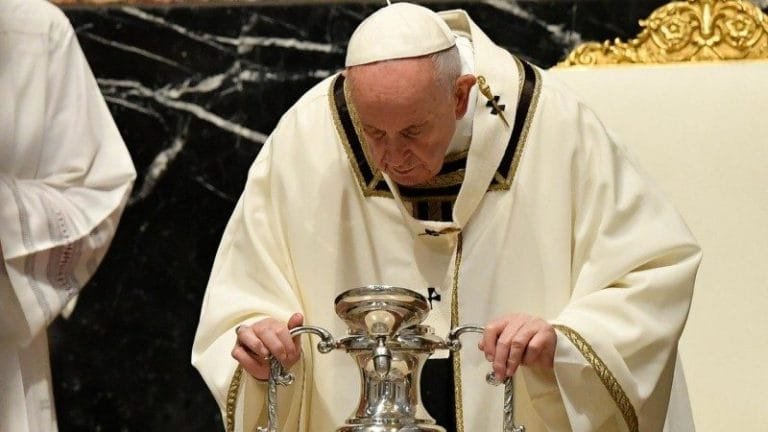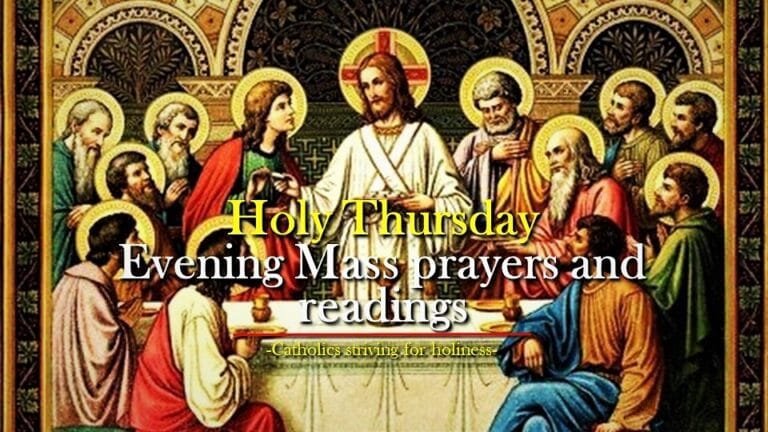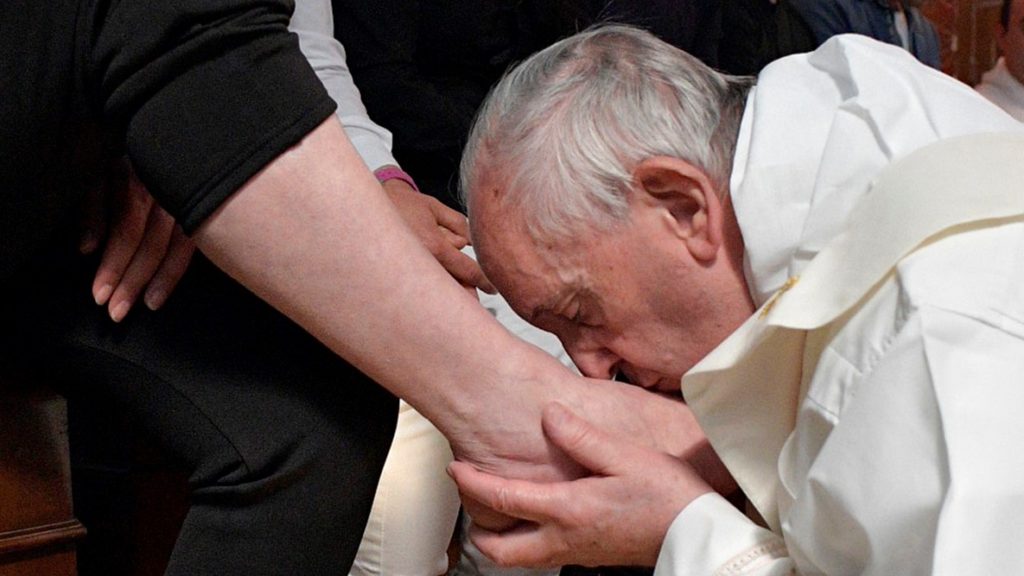Pope Benedict XVI: Holy Thursday Homily
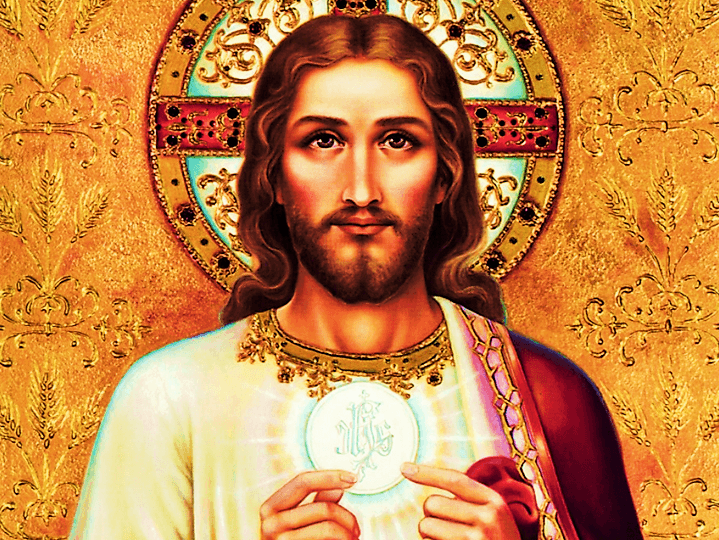
MASS OF THE LORD’S SUPPER
HIS HOLINESS BENEDICT XVI
Basilica of St John Lateran
Holy Thursday homily, 13 April 2006
Dear Brothers in the Episcopate
and in the Priesthood,
Dear Brothers and Sisters,
“Having loved his own who were in the world, he loved them to the end” (Jn 13: 1).
God loves his creature, man; he even loves him in his fall and does not leave him to himself. He loves him to the end. He is impelled with his love to the very end, to the extreme: he came down from his divine glory.
He cast aside the raiment of his divine glory and put on the garb of a slave. He came down to the extreme lowliness of our fall. He kneels before us and carries out for us the service of a slave: he washes our dirty feet so that we might be admitted to God’s banquet and be made worthy to take our place at his table – something that on our own we neither could nor would ever be able to do.
God is not a remote God, too distant or too great to be bothered with our trifles. Since God is great, he can also be concerned with small things. Since he is great, the soul of man, the same man, created through eternal love, is not a small thing but great, and worthy of God’s love.
God’s holiness is not merely an incandescent power before which we are obliged to withdraw, terrified. It is a power of love and therefore a purifying and healing power.
God descends and becomes a slave, he washes our feet so that we may come to his table. In this, the entire mystery of Jesus Christ is expressed. In this, what redemption means becomes visible.
The basin in which he washes us is his love, ready to face death. Only love has that purifying power which washes the grime from us and elevates us to God’s heights.
The basin that purifies us is God himself, who gives himself to us without reserve – to the very depths of his suffering and his death. He is ceaselessly this love that cleanses us; in the sacraments of purification – Baptism and the Sacrament of Penance – he is continually on his knees at our feet and carries out for us the service of a slave, the service of purification, making us capable of God.
His love is inexhaustible, it truly goes to the very end.
“You are clean, but not all of you”, the Lord says (Jn 13: 10). This sentence reveals the great gift of purification that he offers to us, because he wants to be at table together with us, to become our food. “But not all of you” – the obscure mystery of rejection exists, which becomes apparent with Judas’ act, and precisely on Holy Thursday, the day on which Jesus made the gift of himself, it should give us food for thought. The Lord’s love knows no bounds, but man can put a limit on it.
“You are clean, but not all of you”: What is it that makes man unclean?
It is the rejection of love, not wanting to be loved, not loving. It is pride that believes it has no need of any purification, that is closed to God’s saving goodness. It is pride that does not want to admit or recognize that we are in need of purification.
In Judas we see the nature of this rejection even more clearly. He evaluated Jesus in accordance with the criteria of power and success. For him, power and success alone were real; love did not count. And he was greedy: money was more important than communion with Jesus, more important than God and his love.
He thus also became a liar who played a double game and broke with the truth; one who lived in deceit and so lost his sense of the supreme truth, of God. In this way, he became hard of heart and incapable of conversion, of the trusting return of the Prodigal Son, and he disposed of the life destroyed.
“You are clean, but not all of you“. Today, the Lord alerts us to the self-sufficiency that puts a limit on his unlimited love. He invites us to imitate his humility, to entrust ourselves to it, to let ourselves be “infected” by it.
He invites us – however lost we may feel – to return home, to let his purifying goodness uplift us and enable us to sit at table with him, with God himself.
Let us add a final word to this inexhaustible Gospel passage: “For I have given you an example” (Jn 13: 15); “You also ought to wash one another’s feet” (Jn 13: 14). Of what does “washing one another’s feet” consist? What does it actually mean?
This: every good work for others – especially for the suffering and those not considered to be worth much – is a service of the washing of feet.
The Lord calls us to do this: to come down, learn humility and the courage of goodness, and also the readiness to accept rejection and yet to trust in goodness and persevere in it.
But there is another, deeper dimension. The Lord removes the dirt from us with the purifying power of his goodness. Washing one another’s feet means above all tirelessly forgiving one another, beginning together ever anew, however pointless it may seem. It means purifying one another by bearing with one another and by being tolerant of others; purifying one another, giving one another the sanctifying power of the Word of God and introducing one another into the Sacrament of divine love.
The Lord purifies us, and for this reason we dare to approach his table. Let us pray to him to give to all of us the grace of being able to one day be guests for ever at the eternal nuptial banquet. Amen!
Source: https://www.vatican.va/content/benedict-xvi/en/homilies/2006/documents/hf_ben-xvi_hom_20060413_coena-domini.html
Emphasis mine.
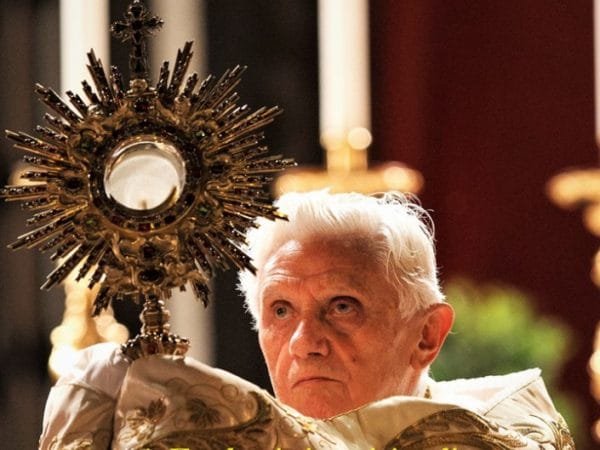
MASS OF THE LORD’S SUPPER
HIS HOLINESS BENEDICT XVI
Basilica of St John Lateran
Holy Thursday homily, 20 March 2008
Dear Brothers and Sisters,
St John begins his account of how Jesus washed his disciples’ feet with an especially solemn, almost liturgical language. “Before the feast of the Passover, when Jesus knew that his hour had come to depart out of this world to the Father, having loved his own who were in the world, he loved them to the end” (Jn 13: 1). Jesus’ “hour”, to which all his work had been directed since the outset, had come. John used two words to describe what constitutes the content of this hour: passage (metabainein, metabasis) and agape – love. The two words are mutually explanatory; they both describe the Pasch of Jesus: the Cross and the Resurrection, the Crucifixion as an uplifting, a “passage” to God’s glory, a “passing” from the world to the Father. It is not as though after paying the world a brief visit, Jesus now simply departs and returns to the Father. The passage is a transformation. He brings with him his flesh, his being as a man. On the Cross, in giving himself, he is as it were fused and transformed into a new way of being, in which he is now always with the Father and contemporaneously with humankind. He transforms the Cross, the act of killing, into an act of giving, of love to the end. With this expression “to the end“, John anticipates Jesus’ last words on the Cross: everything has been accomplished, “It is finished” (19: 30). Through Jesus’ love the Cross becomes metabasis, a transformation from being human into being a sharer in God’s glory. He involves us all in this transformation, drawing us into the transforming power of his love to the point that, in our being with him, our life becomes a “passage”, a transformation. Thus, we receive redemption, becoming sharers in eternal love, a condition for which we strive throughout our life.
This essential process of Jesus’ hour is portrayed in the washing of the feet in a sort of prophetic and symbolic act. In it, Jesus highlights with a concrete gesture precisely what the great Christological hymn in the Letter to the Philippians describes as the content of Christ’s mystery. Jesus lays down the clothes of his glory, he wraps around his waist the towel of humanity and makes himself a servant. He washes the disciples’ dirty feet and thus gives them access to the divine banquet to which he invites them. The devotional and external purifications purify man ritually but leave him as he is replaced by a new bathing: Jesus purifies us through his Word and his Love, through the gift of himself. “You are already made clean by the word which I have spoken to you”, he was to say to his disciples in the discourse on the vine (Jn 15: 3). Over and over again he washes us with his Word. Yes, if we accept Jesus’ words in an attitude of meditation, prayer and faith, they develop in us their purifying power. Day after today we are as it were covered by many forms of dirt, empty words, prejudices, reduced and altered wisdom; a multi-facetted semi-falsity or falsity constantly infiltrates deep within us. All this clouds and contaminates our souls, threatens us with an incapacity for truth and the good. If we receive Jesus’ words with an attentive heart they prove to be truly cleansing, purifications of the soul, of the inner man. The Gospel of the washing of the feet invites us to this, to allow ourselves to be washed anew by this pure water, to allow ourselves to be made capable of convivial communion with God and with our brothers and sisters. However, when Jesus was pierced by the soldier’s spear, it was not only water that flowed from his side but also blood (Jn 19: 34; cf. I Jn 5: 6-8). Jesus has not only spoken; he has not left us only words. He gives us himself. He washes us with the sacred power of his Blood, that is, with his gift of himself “to the end”, to the Cross. His word is more than mere speech; it is flesh and blood “for the life of the world” (Jn 6: 51). In the holy sacraments, the Lord kneels ever anew at our feet and purifies us. Let us pray to him that we may be ever more profoundly penetrated by the sacred cleansing of his love and thereby truly purified!
If we listen attentively to the Gospel, we can discern two different dimensions in the event of the washing of the feet. The cleansing that Jesus offers his disciples is first and foremost simply his action – the gift of purity, of the “capacity for God” that is offered to them. But the gift then becomes a model, the duty to do the same for one another. The Fathers have described these two aspects of the washing of the feet with the words sacramentum and exemplum. Sacramentum in this context does not mean one of the seven sacraments but the mystery of Christ in its entirety, from the Incarnation to the Cross and the Resurrection: all of this becomes the healing and sanctifying power, the transforming force for men and women, it becomes our metabasis, our transformation into a new form of being, into openness for God and communion with him. But this new being which, without our merit, he simply gives to us must then be transformed within us into the dynamic of a new life. The gift and example overall, which we find in the passage on the washing of the feet, is a characteristic of the nature of Christianity in general. Christianity is not a type of moralism, simply a system of ethics. It does not originate in our action, our moral capacity. Christianity is first and foremost a gift: God gives himself to us – he does not give something, but himself. And this does not only happen at the beginning, at the moment of our conversion. He constantly remains the One who gives. He continually offers us his gifts. He always precedes us. This is why the central act of Christian being is the Eucharist: gratitude for having been gratified, joy for the new life that he gives us.
Yet with this, we do not remain passive recipients of divine goodness. God gratifies us as personal, living partners. Love given is the dynamic of “loving together”, it wants to be new life in us starting from God. Thus, we understand the words which, at the end of the washing of the feet, Jesus addresses to his disciples and to us all: “A new commandment I give to you, that you love one another; even as I have loved you, that you also love one another” (Jn 13: 34). The “new commandment” does not consist in a new and difficult norm that did not exist until then. The new thing is the gift that introduces us into Christ’s mentality. If we consider this, we perceive how far our lives often are from this newness of the New Testament and how little we give humanity the example of loving in communion with his love. Thus, we remain indebted to the proof of credibility of the Christian truth which is revealed in love. For this very reason we want to pray to the Lord increasingly to make us, through his purification, mature persons of the new commandment.
In the Gospel of the washing of the feet, Jesus’ conversation with Peter presents to us yet another detail of the praxis of Christian life to which we would like finally to turn our attention. At first, Peter did not want to let the Lord wash his feet: this reversal of order, that is, that the master – Jesus – should wash feet, that the master should carry out the slave’s service, contrasted starkly with his reverential respect for Jesus, with his concept of the relationship between the teacher and the disciple. “You shall never wash my feet”, he said to Jesus with his usual impetuosity (Jn 13: 8). His concept of the Messiah involved an image of majesty, of divine grandeur. He had to learn repeatedly that God’s greatness is different from our idea of greatness; that it consists precisely in stooping low, in the humility of service, in the radicalism of love even to total self-emptying.
And we too must learn it anew because we systematically desire a God of success and not of the Passion; because we are unable to realize that the Pastor comes as a Lamb that gives itself and thus leads us to the right pasture.
When the Lord tells Peter that without the washing of the feet he would not be able to have any part in him, Peter immediately asks impetuously that his head and hands be washed. This is followed by Jesus’ mysterious saying: “He who has bathed does not need to wash, except for his feet” (Jn 13: 10). Jesus was alluding to a cleansing with which the disciples had already complied; for their participation in the banquet, only the washing of their feet was now required. But of course this conceals a more profound meaning. What was Jesus alluding to? We do not know for certain. In any case, let us bear in mind that the washing of the feet, in accordance with the meaning of the whole chapter, does not point to any single specific sacrament but the sacramentum Christi in its entirety – his service of salvation, his descent even to the Cross, his love to the end that purifies us and makes us capable of God. Yet here, with the distinction between bathing and the washing of the feet, an allusion to life in the community of the disciples also becomes perceptible, an allusion to the life of the Church. It then seems clear that the bathing that purifies us once and for all and must not be repeated is Baptism – being immersed in the death and Resurrection of Christ, a fact that profoundly changes our life, giving us as it were a new identity that lasts, if we do not reject it as Judas did. However, even in the permanence of this new identity, given by Baptism, for convivial communion with Jesus we need the “washing of the feet”. What does this involve? It seems to me that the First Letter of St John gives us the key to understanding it. In it we read: “If we say we have no sin, we deceive ourselves, and the truth is not in us. If we confess our sins, he is faithful and just, and will forgive our sins and cleanse us from all unrighteousness” (1: 8ff.). We are in need of the “washing of the feet”, the cleansing of our daily sins, and for this reason we need to confess our sins as St John spoke of in this Letter. We have to recognize that we sin, even in our new identity as baptized persons. We need confession in the form it has taken in the Sacrament of Reconciliation. In it the Lord washes our dirty feet ever anew and we can be seated at table with him.
But in this way the word with which the Lord extends the sacramentum, making it the exemplum, a gift, a service for one’s brother, also acquires new meaning: “If I then, your Lord and Teacher, have washed your feet, you also ought to wash one another’s feet” (Jn 13: 14). We must wash one another’s feet in the mutual daily service of love. But we must also wash one another’s feet in the sense that we must forgive one another ever anew. The debt for which the Lord has pardoned us is always infinitely greater than all the debts that others can owe us (cf. Mt 18: 21-35). Holy Thursday exhorts us to this: not to allow resentment toward others to become a poison in the depths of the soul. It urges us to purify our memory constantly, forgiving one another whole-heartedly, washing one another’s feet, to be able to go to God’s banquet together.
Holy Thursday is a day of gratitude and joy for the great gift of love to the end that the Lord has made to us. Let us pray to the Lord at this hour, so that gratitude and joy may become in us the power to love together with his love. Amen.
Source: https://www.vatican.va/content/benedict-xvi/en/homilies/2008/documents/hf_ben-xvi_hom_20080320_coena-domini.html
Emphasis mine.
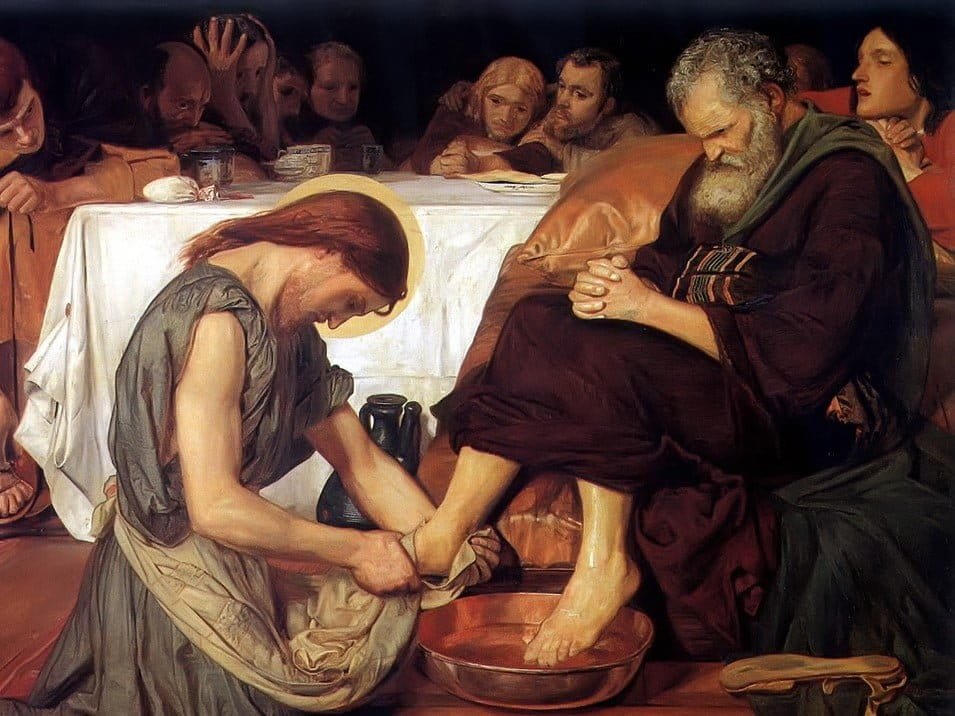
MASS OF THE LORD’S SUPPER
HOMILY OF HIS HOLINESS BENEDICT XVI
Basilica of St John Lateran
Holy Thursday, 1st April 2010
Dear Brothers and Sisters,
In his Gospel, Saint John, more fully than the other three evangelists, reports in his own distinctive way the farewell discourses of Jesus; they appear as his testament and a synthesis of the core of his message. They are introduced by the washing of feet, in which Jesus’ redemptive ministry on behalf of a humanity needing purification is summed up in this gesture of humility. Jesus’ words end as a prayer, his priestly prayer, whose background exegetes have traced to the ritual of the Jewish feast of Atonement. The significance of that feast and its rituals – the world’s purification and reconciliation with God – is fulfilled in Jesus’ prayer, a prayer which anticipates his Passion and transforms it into a prayer. The priestly prayer thus makes uniquely evident the perpetual mystery of Holy Thursday: the new priesthood of Jesus Christ and its prolongation in the consecration of the Apostles, in the incorporation of the disciples into the Lord’s priesthood. From this inexhaustibly profound text, I would like to select three sayings of Jesus which can lead us more fully into the mystery of Holy Thursday.
First, there are the words: “This is eternal life, that they may know you, the only true God, and Jesus Christ, whom you have sent” (Jn 17:3). Everyone wants to have life. We long for a life which is authentic, complete, worthwhile, full of joy. This yearning for life coexists with a resistance to death, which nonetheless remains unescapable. When Jesus speaks about eternal life, he is referring to real and true life, a life worthy of being lived. He is not simply speaking about life after death. He is talking about authentic life, a life fully alive and thus not subject to death, yet one which can already, and indeed must, begin in this world. Only if we learn even now how to live authentically, if we learn how to live the life which death cannot take away, does the promise of eternity become meaningful. But how does this happen? What is this true and eternal life which death cannot touch? We have heard Jesus’ answer: this is eternal life, that they may know you – God – and the one whom you have sent, Jesus Christ. Much to our surprise, we are told that life is knowledge. This means first of all that life is relationship. No one has life from himself and only for himself. We have it from others and in a relationship with others. If it is a relationship in truth and love, a giving and receiving, it gives fullness to life and makes it beautiful. But for that very reason, the destruction of that relationship by death can be especially painful, it can put life itself in question. Only a relationship with the One who is himself Life can preserve my life beyond the floodwaters of death, can bring me through them alive. Already in Greek philosophy we encounter the idea that man can find eternal life if he clings to what is indestructible – to truth, which is eternal. He needs, as it were, to be full of truth in order to bear within himself the stuff of eternity. But only if truth is a Person, can it lead me through the night of death. We cling to God – to Jesus Christ the Risen One. And thus we are led by the One who is himself Life. In this relationship we too live by passing through death, since we are not forsaken by the One who is himself Life.
But let us return to Jesus’s words – this is eternal life: that they know you and the One whom you have sent. Knowledge of God becomes eternal life. Clearly “knowledge” here means something more than mere factual knowledge, as, for example, when we know that a famous person has died or a discovery was made. Knowing, in the language of sacred Scripture, is an interior becoming one with the other. Knowing God, knowing Christ, always means loving him, becoming, in a sense, one with him by virtue of that knowledge and love. Our life becomes authentic and true life, and thus eternal life, when we know the One who is the source of all being and all life. And so Jesus’ words become a summons: let us become friends of Jesus, let us try to know him all the more! Let us live in dialogue with him! Let us learn from him how to live aright, let us be his witnesses! Then we become people who love and then we act aright. Then we are truly alive.
Twice in the course of the priestly prayer Jesus speaks of revealing God’s name. “I have made your name known to those whom you gave me from the world” (v. 6). “I have made your name known to them, and I will make it known, so that the love with which you have loved me may be in them, and I in them” (v. 26). The Lord is alluding here to the scene of the burning bush, when God, at Moses’ request, had revealed his name. Jesus thus means to say that he is bringing to fulfilment what began with the burning bush; that in him God, who had made himself known to Moses, now reveals himself fully. And that in doing so he brings about reconciliation; that the love with which God loves his Son in the mystery of the Trinity now draws men and women into this divine circle of love. But what, more precisely, does it mean to say that the revelation made from the burning bush is finally brought to completion, fully attains its purpose? The essence of what took place on Mount Horeb was not the mysterious word, the “name” which God had revealed to Moses, as a kind of mark of identification. To give one’s name means to enter into relationship with another. The revelation of the divine name, then, means that God, infinite and self-subsistent, enters into the network of human relationships; that he comes out of himself, so to speak, and becomes one of us, present among us and for us. Consequently, Israel saw in the name of God not merely a word steeped in mystery, but an affirmation that God is with us. According to sacred Scripture, the Temple is the dwelling-place of God’s name. God is not confined within any earthly space; he remains infinitely above and beyond the world. Yet in the Temple he is present for us as the One who can be called – as the One who wills to be with us. This desire of God to be with his people comes to completion in the incarnation of the Son. Here what began at the burning bush is truly brought to completion: God, as a Man, is able to be called by us and he is close to us. He is one of us, yet he remains the eternal and infinite God. His love comes forth, so to speak, from himself and enters into our midst. The mystery of the Eucharist, the presence of the Lord under the appearances of bread and wine, is the highest and most sublime way in which this new mode of God’s being-with-us takes shape. “Truly you are a God who is hidden, O God of Israel”, the prophet Isaiah had prayed (45:15). This never ceases to be true. But we can also say: Truly you are a God who is close, you are a God-with-us. You have revealed your mystery to us, you have shown your face to us. You have revealed yourself and given yourself into our hands… At this hour joy and gratitude must fill us, because God has shown himself, because he, infinite and beyond the grasp of our reason, is the God who is close to us, who loves us, and whom we can know and love.
The best-known petition of the priestly prayer is the petition for the unity of the disciples, now and yet to come. The Lord says, “I do not ask only on behalf of these – that is, the community of the disciples gathered in the Upper Room – but also on behalf of those who will believe in me through their word, that they may all be one. As you, Father, are in me, and I am in you, may they also be in us, so that the world may believe that you have sent me” (v. 20ff.; cf. vv. 11 and 13). What exactly is the Lord asking for? First, he prays for his disciples, present and future. He peers into the distance of future history. He sees the dangers there and he commends this community to the heart of the Father. He prays to the Father for the Church and for her unity. It has been said that in the Gospel of John the Church is not present – and it is true that word ekklesia is not used by John – and yet she appears here in her essential features: as the community of disciples who through the apostolic preaching believe in Jesus Christ and thus become one. Jesus prays for the Church to be one and apostolic. This prayer, then, is properly speaking an act which founds the Church. The Lord prays to the Father for the Church. She is born of the prayer of Jesus and through the preaching of the Apostles, who make known God’s name and introduce men and women into the fellowship of love with God. Jesus thus prays that the preaching of the disciples will continue for all time, that it will gather together men and women who know God and the one he has sent, his Son Jesus Christ. He prays that men and women may be led to faith and, through faith, to love. He asks the Father that these believers “be in us” (v. 21); that they will live, in other words, in interior communion with God and Jesus Christ, and that this inward being in communion with God may give rise to visible unity. Twice the Lord says that this unity should make the world believe in the mission of Jesus. It must thus be a unity which can be seen – a unity which so transcends ordinary human possibilities as to become a sign before the world and to authenticate the mission of Jesus Christ. Jesus’ prayer gives us the assurance that the preaching of the Apostles will never fail throughout history; that it will always awaken faith and gather men and women into unity – into a unity which becomes a testimony to the mission of Jesus Christ. But this prayer also challenges us to a constant examination of conscience. At this hour the Lord is asking us: are you living, through faith, in fellowship with me and thus in fellowship with God? Or are you rather living for yourself, and thus apart from faith? And are you not thus guilty of the inconsistency which obscures my mission in the world and prevents men and women from encountering God’s love? It was part of the historical Passion of Jesus, and remains part of his ongoing Passion throughout history, that he saw, and even now continues to see, all that threatens and destroys unity. As we meditate on the Passion of the Lord, let us also feel Jesus’ pain at the way that we contradict his prayer, that we resist his love, that we oppose the unity which should bear witness before the world to his mission.
At this hour, when the Lord in the most holy Eucharist gives himself, his body and his blood, into our hands and into our hearts, let us be moved by his prayer. Let us enter into his prayer and thus beseech him: Lord, grant us faith in you, who are one with the Father in the Holy Spirit. Grant that we may live in your love and thus become one, as you are one with the Father, so that the world may believe. Amen.
© Copyright 2010 – Libreria Editrice Vaticana
EMPHASIS MINE
THUMBNAIL PHOTO CREDIT: Franco Origlia/Getty Images
Stay updated: subscribe by email for free TO OUR NEW WEBSITE www.catholicsstrivingforholiness.org (PUT YOUR EMAIL IN THE SUBSCRIBE WIDGET).
We are also in www.fb.com/Catholicsstrivingforholiness. Kindly help more people in their Christian life by liking our page and inviting your family, friends and relatives to do so as well. Thanks in advance and God bless you and your loved ones! Fr. Rolly Arjonillo
